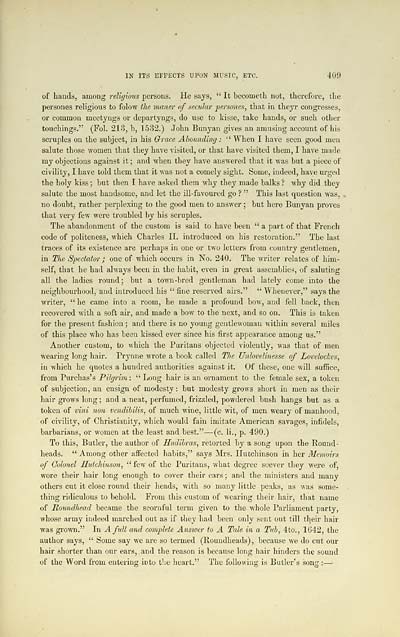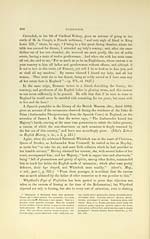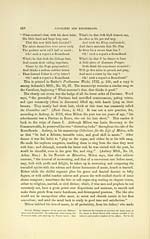Glen Collection of printed music > Printed text > Popular music of the olden time > Volume 2
(33) Page 409
Download files
Complete book:
Individual page:
Thumbnail gallery: Grid view | List view

IN ITS EFFECTS UPON MUSIC, ETC. 409
of hands, among religious persons. He says, " It becometh not, therefore, the
persones religious to folow the maner of secular persones, that in thcyr congresses,
or common meetyngs or departyngs, do use to kisse, take hands, or such other
touchings." (Fol. 213, b, 1532.) John Bunyan gives an amusing account of bis
scruples on the subject, in his Grace Abounding : " When I have seen good men
salute those women that they have visited, or that have visited them, I have made
my objections against it ; and when they have answered that it was but a piece of
civility, I have told them that it was not a comely sight. Some, indeed, have urged
the holy kiss ; but then I have asked them why they made balks ? why did they
salute the most handsome, and let the ill-favoured go ? " This last question was,
no doubt, rather perplexing to the good men to answer ; but here Bunyan proves
that very few were troubled by his scruples.
The abandonment of the custom is said to have been " a part of that French
code of politeness, which Charles II. introduced on his restoration." The last
traces of its existence are perhaps in one or two letters from country gentlemen,
in The Spectator ; one of which occurs in No. 240. The writer relates of him-
self, that he had always been in the habit, even in great assemblies, of saluting
all the ladies round; but a town -bred gentleman had lately come into the
neighbourhood, and introduced his " fine reserved airs." " Whenever," says the
writer, " he came into a room, he made a profound bow, and fell back, then
recovered with a soft air, and made a bow to the next, and so on. This is taken
for the present fashion ; and there is no young gentlewoman within several miles
of this place who has been kissed ever since his first appearance among us."
Another custom, to which the Puritans objected violently, was that of men
wearing long hair. Prynne wrote a book called The Unlovelinesse of Lovelockes,
in which he quotes a hundred authorities against it. Of these, one will suffice,
from Purchas's Pilgrim : " Long hair is an ornament to the female sex, a token
of subjection, an ensign of modesty: but modesty grows short in men as their
hair grows long ; and a neat, perfumed, frizzled, powdered bush hangs but as a
token of vini non vendibilis, of much wine, little wit, of men weary of manhood,
of civility, of Christianity, which would fain imitate American savages, infidels,
barbarians, or women at the least and best." — (c. li., p. 490.)
To this, Butler, the author of Hudibras, retorted by a song upon the Round-
heads. " Among other affected habits," says Mrs. Hutchinson in her Memoirs
of Colonel Hutchinson, " few of the Puritans, what degree soever they were of,
wore their hair long enough to cover their ears ; and the ministers and many
others cut it close round their heads, with so many little peaks, as was some-
thing ridiculous to behold. From this custom of wearing their hair, tbat name
of Roxmdhead became the scornful term given to the whole Parliament party,
whose army indeed marched out as if they had been only sent out till their hair
was grown." In A full and complete Answer to A Tale in a Tub, 4to., 1642, the
author says, " Some say we are so termed (Roundheads), because we do cut our
hair shorter than our ears, and the reason is because long hair hinders the sound
of the Word from entering into the heart." The following is Butler's song : —
of hands, among religious persons. He says, " It becometh not, therefore, the
persones religious to folow the maner of secular persones, that in thcyr congresses,
or common meetyngs or departyngs, do use to kisse, take hands, or such other
touchings." (Fol. 213, b, 1532.) John Bunyan gives an amusing account of bis
scruples on the subject, in his Grace Abounding : " When I have seen good men
salute those women that they have visited, or that have visited them, I have made
my objections against it ; and when they have answered that it was but a piece of
civility, I have told them that it was not a comely sight. Some, indeed, have urged
the holy kiss ; but then I have asked them why they made balks ? why did they
salute the most handsome, and let the ill-favoured go ? " This last question was,
no doubt, rather perplexing to the good men to answer ; but here Bunyan proves
that very few were troubled by his scruples.
The abandonment of the custom is said to have been " a part of that French
code of politeness, which Charles II. introduced on his restoration." The last
traces of its existence are perhaps in one or two letters from country gentlemen,
in The Spectator ; one of which occurs in No. 240. The writer relates of him-
self, that he had always been in the habit, even in great assemblies, of saluting
all the ladies round; but a town -bred gentleman had lately come into the
neighbourhood, and introduced his " fine reserved airs." " Whenever," says the
writer, " he came into a room, he made a profound bow, and fell back, then
recovered with a soft air, and made a bow to the next, and so on. This is taken
for the present fashion ; and there is no young gentlewoman within several miles
of this place who has been kissed ever since his first appearance among us."
Another custom, to which the Puritans objected violently, was that of men
wearing long hair. Prynne wrote a book called The Unlovelinesse of Lovelockes,
in which he quotes a hundred authorities against it. Of these, one will suffice,
from Purchas's Pilgrim : " Long hair is an ornament to the female sex, a token
of subjection, an ensign of modesty: but modesty grows short in men as their
hair grows long ; and a neat, perfumed, frizzled, powdered bush hangs but as a
token of vini non vendibilis, of much wine, little wit, of men weary of manhood,
of civility, of Christianity, which would fain imitate American savages, infidels,
barbarians, or women at the least and best." — (c. li., p. 490.)
To this, Butler, the author of Hudibras, retorted by a song upon the Round-
heads. " Among other affected habits," says Mrs. Hutchinson in her Memoirs
of Colonel Hutchinson, " few of the Puritans, what degree soever they were of,
wore their hair long enough to cover their ears ; and the ministers and many
others cut it close round their heads, with so many little peaks, as was some-
thing ridiculous to behold. From this custom of wearing their hair, tbat name
of Roxmdhead became the scornful term given to the whole Parliament party,
whose army indeed marched out as if they had been only sent out till their hair
was grown." In A full and complete Answer to A Tale in a Tub, 4to., 1642, the
author says, " Some say we are so termed (Roundheads), because we do cut our
hair shorter than our ears, and the reason is because long hair hinders the sound
of the Word from entering into the heart." The following is Butler's song : —
Set display mode to: Large image | Transcription
Images and transcriptions on this page, including medium image downloads, may be used under the Creative Commons Attribution 4.0 International Licence unless otherwise stated. ![]()
| Special collections of printed music > Glen Collection of printed music > Printed text > Popular music of the olden time > Volume 2 > (33) Page 409 |
|---|
| Permanent URL | https://digital.nls.uk/91362390 |
|---|
| Shelfmark | Glen.254a |
|---|---|
| Additional NLS resources: | |
| Attribution and copyright: |
|
| Description | Scottish songs and music of the 18th and early 19th centuries, including music for the Highland bagpipe. These are selected items from the collection of John Glen (1833 to 1904). Also includes a few manuscripts, some treatises, and other books on the subject. |
|---|
| Description | The Glen Collection and the Inglis Collection represent mainly 18th and 19th century Scottish music, including Scottish songs. The collections of Berlioz and Verdi collected by bibliographer Cecil Hopkinson contain contemporary and later editions of the works of the two composers Berlioz and Verdi. |
|---|

